The Intel Core i3-7350K (60W) Review: Almost a Core i7-2600K
by Ian Cutress on February 3, 2017 8:00 AM ESTLegacy and Synthetic Tests
At AnandTech, I’ve taken somewhat of a dim view to pure synthetic tests, as they fail to be relatable. Nonetheless, our benchmark database spans to a time when that is all we had! We take a few of these tests for a pin with the latest hardware.
Cinebench R10
The R10 version of Cinebench is one of our oldest benchmarks, with data going back more than a few generations. The benchmark is similar to that of the newest R15 version, albeit with a simpler render target and a different strategy for multithreading.
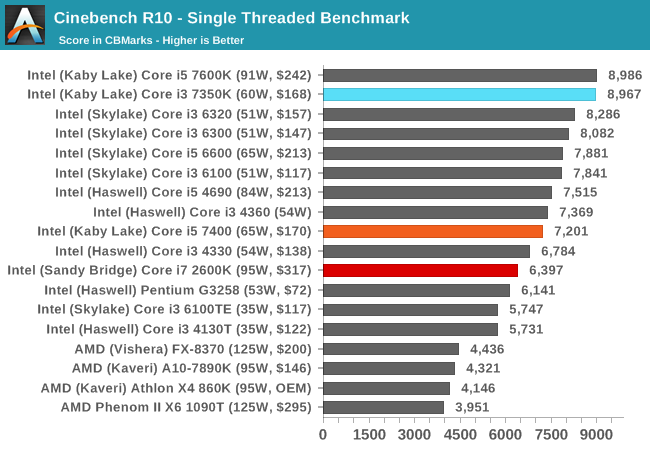
With high frequency in tow, the Core i3-7350K makes its mark.
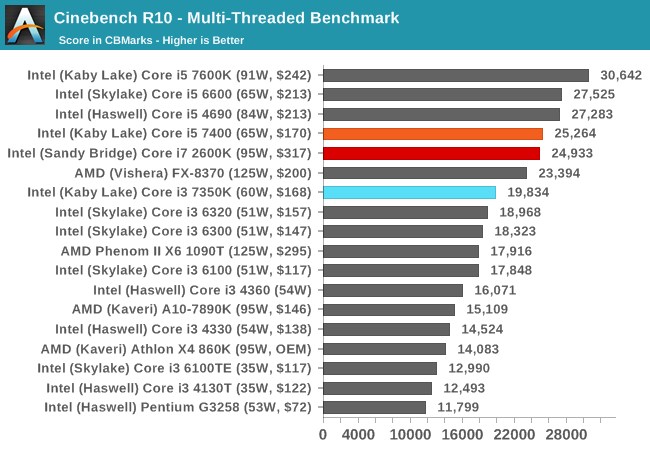
When more threads come to play, the Core i5-7400 and Core i7-2600K battle it out in terms of four cores and IPC vs hyperthreading. The Core i3-7350K sits around ~25% behind.
Cinebench R11.5
CB11.5 has been popular for many years as a performance test, using easy to read and compare numbers that aren’t in the 1000s. We run the benchmark in an automated fashion three times in single-thread and multi-thread mode and take the average of the results.
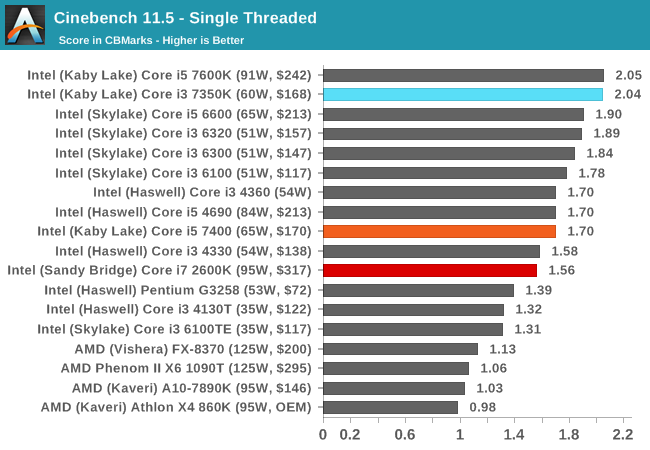
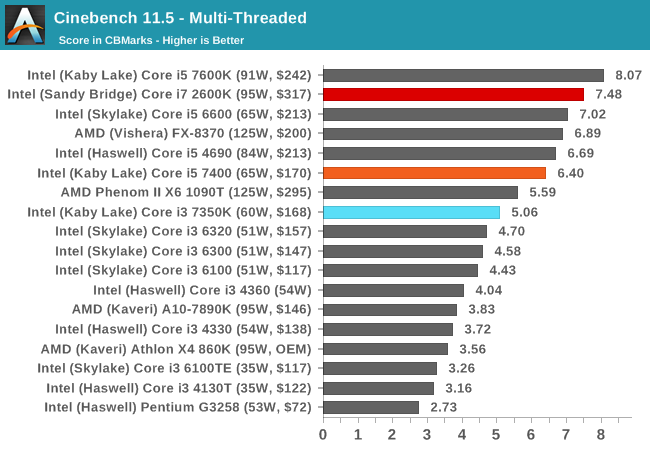
Similar to CB10, the single thread results show that a 4.2 GHz Kaby Lake is nothing to be sniffed at. In the multithreaded test, CB11.5 is more able to leverage the hyperthreads, showing that a Core i7-2600K will run rings around the low end Kaby i5, but is bested by the higher frequency Kaby i5-K. The Core i3 still has that dual core deficit.
7-zip
As an open source compression/decompression tool, 7-zip is easy to test and features a built-in benchmark to measure performance. As a utility, similar to WinRAR, high thread counts, frequency and UPC typically win the day here.
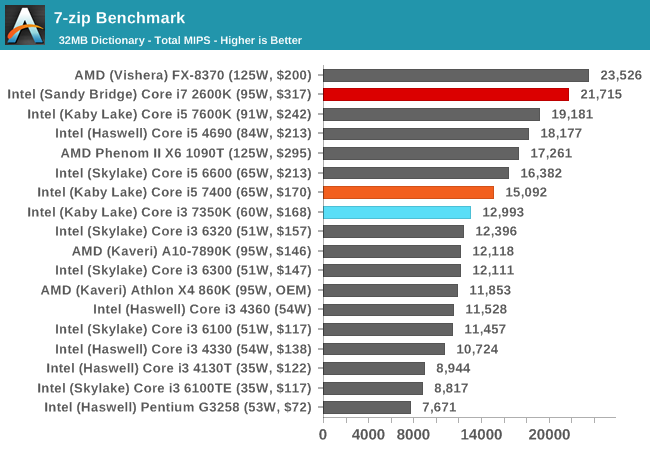
The difference between the i3-7350K and the i5-7400 shows that 7-zip prefers cores over threads, but the Core i7-2600K results show it can use both to good effect, even on older microarchitectures, scoring almost double the i3-7350K.
POV-Ray
Ray-tracing is a typical multithreaded test, with each ray being a potential thread in its own right ensuring that a workload can scale in complexity easily. This lends itself to cores, frequency and IPC: the more, the better.
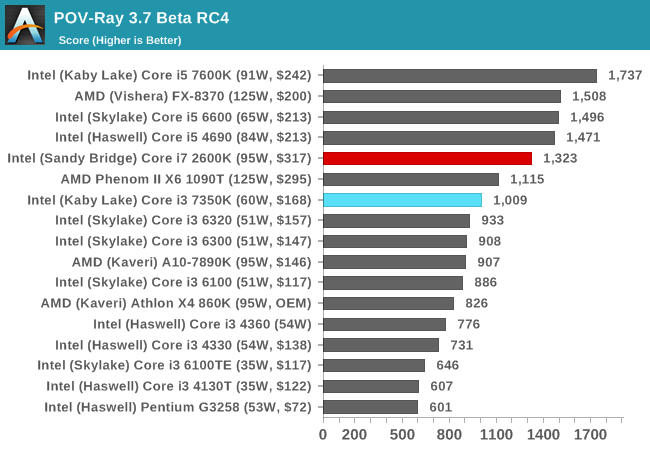
POV-Ray is a benchmark that is usually touted as liking high IPC, high frequency and more threads. The i7-2600K, despite having double the resources of the Core i3-7350K, is only 30% ahead.
AES via TrueCrypt
Despite TrueCrypt no longer being maintained, the final version incorporates a good test to measure different encryption methodologies as well as encryption combinations. When TrueCrypt was in full swing, the introduction of AES accelerated hardware dialed the performance up a notch, however most of the processors (save the Pentiums/Celerons) now support this and get good speed. The built-in TrueCrypt test does a mass encryption on in-memory data, giving results in GB/s.
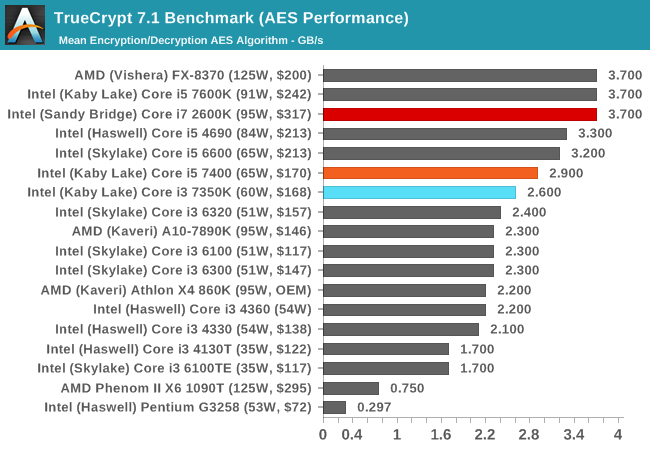










186 Comments
View All Comments
fanofanand - Friday, February 3, 2017 - link
More to the point, the difference between SSD and HDD is bigger than the difference between Q6600 and i5 7400.BrokenCrayons - Friday, February 3, 2017 - link
I agree with fanofanand on this one. I previously owned a Q6600 and went through the trouble of upgrading to an Athlon x4 860K (recently died) with a lot more/faster RAM (16GB DDR3 2133 vs 4GB DDR2 800). The difference was pretty underwhelming. I've got a Haswell i7 at the office and was moving between it and the Q6600 and the difference in performance was something I noticed, but it didn't leave me feeling like the Q6600 was incomparably slow.Hrel - Friday, February 3, 2017 - link
I'm just gonna point out that anyone saying Intel is in trouble, needs to realize that they have intentionally chosen to not improve CPU performance for several years, instead focusing on improving the integrated GPU. Look how much that's increased! That's in addition to incrementally improving CPU performance.Intel can start channeling their immense resources into improving CPU performance anytime they wish.
Remember, it's in Intel's best interests to keep AMD from going out of business. Outpacing them to the point of making AMD irrelevant would hurt Intel, long term.
CaedenV - Friday, February 3, 2017 - link
I really don't think that Ryzen is going to make Intel dramatically bump up the per-clock efficiency.The real bottle-neck in performance is in the instruction set itself. AMD is behind Intel because they are hitting the same IPC wall. It isn't that Intel hasn't attempted to push the envelope on IPC, it is that it is a universally hard thing to improve at this stage in the game. If it wasn't so difficult then AMD would have stepped up to the task years ago. Even Ryzen isn't going to beat intel in IPC, they are merely going to close the gap a bit, sell for less, and partner with game studios to push bundles.
Die shrinks will continue to make chips more efficient, but unless someone finds a way to dramatically increase clock speed, or come out with a new instruction set that has better IPC while being backwards compatible with x86 (with minimal performance hit, which is the hard part), then I think we are stuck at this level of performance for a long time.
fanofanand - Friday, February 3, 2017 - link
Graphene.BrokenCrayons - Friday, February 3, 2017 - link
Number 2 pencils all over the world unite! :3AndrewJacksonZA - Saturday, February 4, 2017 - link
lolfanofanand - Sunday, February 5, 2017 - link
Think you may confusing graphene with graphite ;)BrokenCrayons - Tuesday, February 7, 2017 - link
Maybe I am.....oooooor maybe the pencils know something we don't!Aerodrifting - Friday, February 3, 2017 - link
There are plenty of games that can bottleneck i5 or even low power i7, Which those benchmarks never show. People who do this sorts of review clearly never play any demanding games, Therefore they are not fit to do a comparison for gaming CPUs.